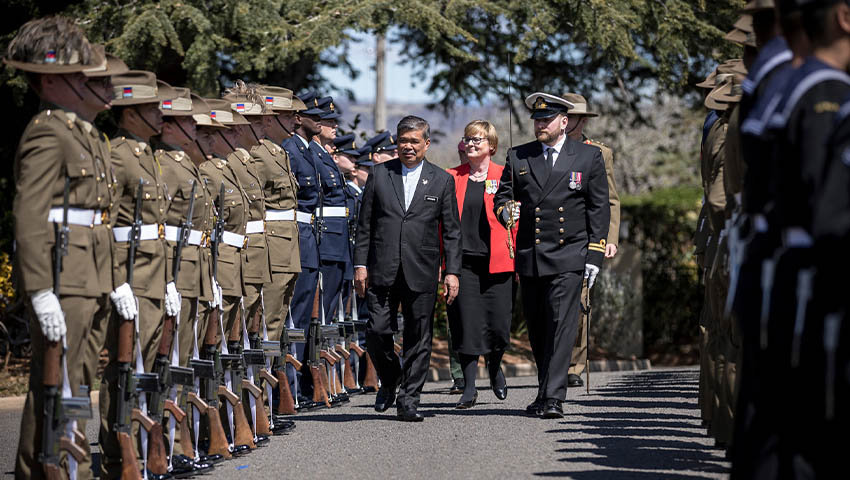Defence Minister Linda Reynolds has hosted her Malaysian counterpart, Defence Minister Mohamad bin Sabu, in Canberra for the second Malaysia-Australia High Level Committee.
Australian Minister for Defence Linda Reynolds and Malaysian Minister of Defence Mohamad bin Sabu, held the second Malaysia-Australia High Level Committee in Canberra, Australia, on 25 September 2019.
The meeting’s wide-ranging and open discussion reflected the strength and breadth of the relationship, and the spirit of friendship and shared interest in addressing the region’s security challenges.
Both Ministers sought to focus on a number of key focus areas of mutual interest for both nations, namely:
A firm commitment to regional security cooperation: Minister Reynolds and Minister Mohamad welcomed the opportunity to exchange views on the complex defence and security challenges in the region.
As the Association of Southeast Asian Nations’ (ASEAN) first dialogue partner, Minister Reynolds emphasised Australia’s strong and longstanding support for ASEAN and its central role in support of regional security, including through its convening of the region’s most important strategic forums.
Both Ministers agreed that ASEAN principles of openness, transparency, inclusivity and respect for international law, as set out in ASEAN’s Outlook on the Indo-Pacific, were essential ingredients of peace and security in the Indo-Pacific.
Five Power Defence Arrangements: The Ministers reaffirmed their commitment to the Five Power Defence Arrangements (FPDA), which they viewed as an integral part of the region’s security architecture, and of particular relevance in light of the 50th anniversary of the FPDA in 2021.
The FPDA has built trust and enhanced interoperability among the militaries of member nations, and contributed to peace and security in the region. The Ministers agreed to continue to enhance the operational value of the exercises, including incorporating maritime security and counterterrorism elements.
Organisational reform in a Defence context: Both Ministers agreed that the challenges associated with Defence reform offered scope for further cooperation, particularly in the areas of governance and procurement, and also in respect of Defence industry and capability life cycle development.
Building on these individual factors, Minister Reynolds and Minister Mohamad sought to identify on a series of critical initiatives to “further strengthen the relationship” between the two longstanding strategic partners:
- Both Ministers recognised that, as close regional partners, Australia and Malaysia would increase collaboration on defence industry.
a. Ministers agreed to expand Australia and Malaysia’s Defence industry cooperation, through the establishment of a Defence Industry and Innovation Working Group under the Malaysia-Australia Joint Defence Program Dialogue framework.
b. Ministers supported the negotiation of a government-to-government agreement, which will enable coordination and support in aircraft capability cooperation. The Royal Malaysian Air Force-Royal Australian Air Force agreement will increase F-18 Hornet sustainment and maintenance cooperation. -
Ministers recognised that people-to-people ties were critical to developing a mutually beneficial relationship between our countries. The Ministers were pleased to see the continuation of reciprocal instructor exchanges, including at each country’s respective staff colleges, peacekeeping centres and language schools.
a. Ministers agreed to increase the number of Malaysian Armed Forces (MAF) members seconded into the Australian Defence Force (ADF) from 12 to 14; and the number of ADF members seconded to the MAF from seven to eight.
b. They also welcomed the creation of a new seconded officer position of a senior Royal Malaysian Air Force officer to undertake a 12 month fellowship at the Australian Air Power Development Centre, to commence in 2020.
c. A senior Royal Malaysian Navy officer will also be offered a three month fellowship at the Australian Sea Power Centre, starting in 2020. - The Ministers agreed that reciprocal training and education activities continue to strengthen the people-to-people links and foundations of trust that underpin the relationship. Around 140 Malaysian military personnel and civilians train and study at Australian institutions and universities each year. Reciprocally, roughly 50 Australian Defence Force members attend training and education courses in Malaysia each year, including at the Malaysian Armed Forces Staff College. Minister Reynolds announced two additional Defence scholarships for Malaysia, including a new civilian scholarship. Combined with the increase in scholarships agreed at the 2018 Malaysia-Australia High Level Committee, this represents a doubling in scholarships for Malaysia since release of the 2016 Defence White Paper.
Get involved with the discussion and let us know your thoughts on Australia's future role and position in the Indo-Pacific and what you would like to see from Australia's political leaders in terms of defining this in the comments section below, or get in touch with



